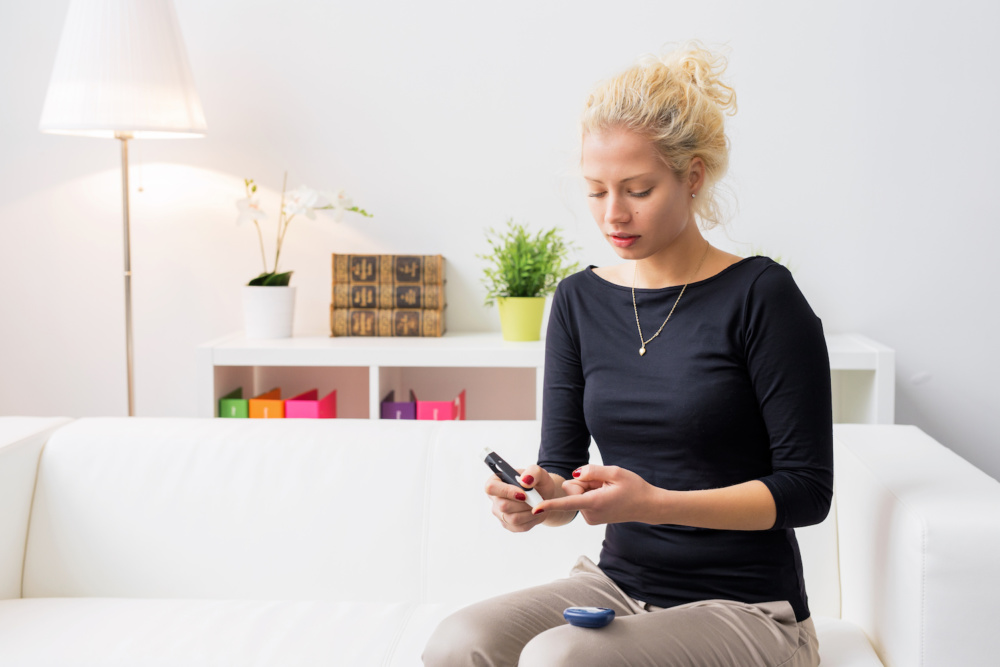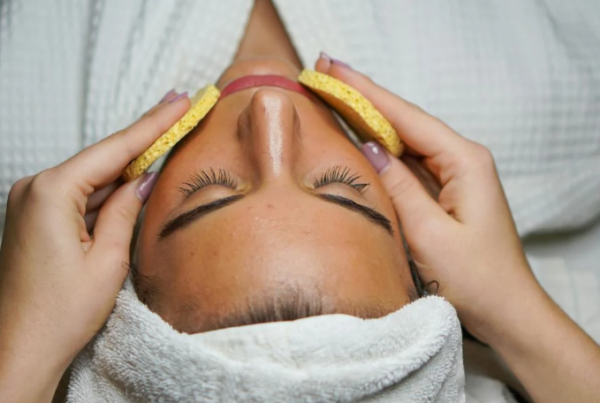[dropcap size=small]I[/dropcap] am constantly teaching and reminding my clients that they have to
commit to a lifestyle change and get out of the “diet” mentality. I work with them to make changes and adjustments in their habits and choices and am always so impressed at how quickly they improve when they incorporate these changes into their lifestyle:
- Move more. Get out and take a walk around the neighborhood, take the stairs, and choose to park in parking spots farther away when you are out. This can help lower your blood sugar and help you lose excess weight. Make sure to have a pair of well-fitting shoes, especially if you are diabetic.
- Resistance training. Strength training is one of the best things you can do for your body. For those who are at risk or have diabetes, resistance training also helps your body respond better to insulin and helps lower and stabilize the blood sugar. It helps you build and maintain lean weight, which is important in keeping your metabolism going. It also assists in weight and body fat loss.
- Eat small, frequent meals. Aim to eat every 2.5 to 3 hours, with your first meal within 45 minutes of waking up. Again, this will help stabilize your blood sugar and kick start that metabolism to help lose those unwanted pounds.
- Eat protein with each meal. Protein stabilizes blood sugar levels and helps build and maintain lean muscle. Incorporating protein in each meal will also keep you full for longer. Although protein requires insulin for metabolism, it has minimal effect on blood glucose levels.
- Increase good fats. Good fats help keep you full longer, curb sugar cravings, and are vital for the production of healthy cells, hormones and energy. Include in small amounts a variety of Essential Fatty Acids also known as EFAs such as avocado, nuts, nut butters, seeds and olive oil. Coconut oil or Butter, a Medium Chain Triglyceride or MCT, is a great fat source and has many health benefits including combating insulin resistance.
- Decrease sugar intake. Limiting your sugar intake can help control weight gain, which can increase chances of type 2 Diabetes. It can also help control your blood sugar levels.
- Limit the carbs, and take out white carbs altogether. We need carbohydrates for energy, but too many raises blood sugar and causes weight gain, which leads to a greater risk of Type II Diabetes. White carbs have higher glycemic index which releases glucose quickly into the bloodstream. Choose complex carbs like, oatmeal, sweet potato, brown rice and black beans over simple carbs such as white potatoes, bread and rice. Limit your fruit to small servings and choose berries which are high in fiber, antioxidants and lower glycemic.
- Eat more veggies and fibrous foods. Vegetables contain vitamins, minerals, fiber, and phytonutrients, which are all integral to your health. Fiber helps stabilize blood sugar levels by slowing down the rate that your body absorbs sugar, so you should try to eat 20-30 grams of fiber daily.
- Increase water intake, drink low calorie drinks and limit alcohol. Not only will watching your calorie intake from your liquids help keep the blood sugars stable, but will save calories as well, helping you lose those unwanted pounds. I recommend trying to shoot for 2-3 liters of water and drinking unsweetened tea, coffee and zero-calorie flavored drinks occasionally to help keep you hydrated. You can sweeten your tea or coffee with stevia, truvia or something similar and use unsweetened Almond or Coconut Milk as creamer for coffee. Alcohol not only affects your ability to lose unwanted pounds but can affect your blood sugar by causing it to go too high or extremely low, depending on how much you consume. Although I don’t recommend it to my clients, if you do drink alcohol, try to limit to occasionally; drink plenty of water when consuming, make sure you eat before and don’t replace alcohol for regular meals.
- Rest and de-stress. Not getting enough rest can cause insulin resistance. It is recommended to get 6-8 hours of sleep each night. You can manage stress levels through exercise, meditation, walking, yoga, and/or massage therapy.
Some exercise tips to follow if you are diabetic:
- Always check your blood sugar before exercising. You may also need to check during exercise if exercising for a long period of time.
- Eat a healthy snack 30 minutes to an hour before working out, such as: a ½ cup to 1 cup of low-fat yogurt or cottage cheese, ½ cup blueberries, and 2Tbs chopped nuts or a Protein bar with low sugar.
- Keep something nearby that can raise your blood sugar quickly in case it drops. 3 or 4 glucose tablets, 1 tablespoon of honey, or 3 or 4 hard candies will generally be enough to raise your sugar.
- If you get shaky, light headed, dizzy or nauseous those can all be of initial signs your blood sugar may be getting low.
- If you use insulin, check with your doctor to find out how to adjust your dose when you exercise.
- Don’t inject the body part you are going to be focusing on.

Whether it be lack of knowledge or self-care, my goal is to educate, motivate, and inspire each person at their own level to reach success, which empowers them to continue their journey and in many cases inspire others.
Because each person is different, my job as a coach is to help introduce these changes in small doses so that it is less overwhelming. You can’t expect overnight results, but with patience, persistence, and consistency, these guidelines can change your life whether you are prone to, or suffer from diabetes, or are just trying to live a healthier lifestyle. I am a firm believer that by taking charge of your lifestyle, you can control your health!
Sonya Roemisch, B.S. CPT, has been in the Fitness & Wellness industry for over 20 years and is the founder and owner of Younique Physique and Younique Fitness and Wellness LLC. She is a fitness model, writer, WBFF Bikini Athlete, and 2015 Ms. Fit American Beauty. Since opening Younique Physique in 2005, Sonya has helped thousands of clients transform their bodies and their health. She has a passion for educating, motivating, and inspiring others to reach their potential with her down-to-earth approach. For more information, please visit youniquephysique.com and connect with Sonya on Facebook and Instagram (@youniquephysique) and Twitter (@sonyaroemisch). You can also subscribe to her Youtube channel TheYouniquePhysique.






Recent Comments